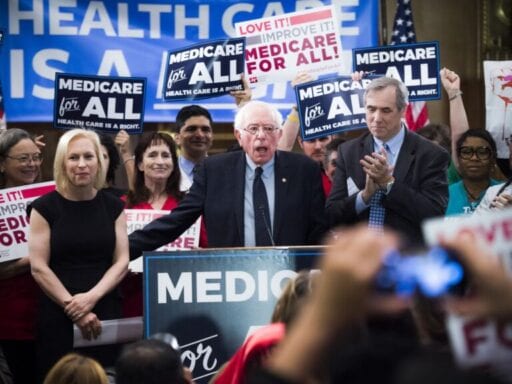The case for not worrying about Medicare-for-all’s electability.
Insert all caveats about the unpredictability of politics here, but it sure looks as though Bernie Sanders and Medicare-for-all could be on the ballot against Donald Trump in November.
It’s an experiment our democracy has never run before: an avowed democratic socialist on top of a major-party ticket, running on a single-payer program that would fundamentally transform American health care. Nobody knows what the results would be.
The politics of Medicare-for-all will be debated endlessly for the rest of the year, should Sanders secure the nomination. But there are a bunch of open questions we don’t yet know the answers to.
How much will Trump’s campaign focus on health care, given his own record? It has millions to spend on a negative ad campaign, but it will need to pick its message. Will Sanders moderate himself at all? I took note of his campaign promising that a Medicare-for-all bill would be introduced during the first week of his presidency, which is not the same thing as pledging such a bill would actually be passed and become law.
I did my best to sort through all the evidence in this story. In short, Medicare-for-all is working for Sanders in the primary because, well, Democratic voters generally support replacing private insurance with a single government plan. It is that simple.
“It is a winner for Bernie because it is part of his brand and it feels authentic coming from him,” Ashley Kirzinger, who helps run the polling by the Kaiser Family Foundation, told me. “I mean, he is the reason why we are discussing it and it has been front and center during the Democratic campaign.”
As for the general election, we just don’t know how the issue would play; there is evidence to make the case Medicare-for-all would be a winner, a loser or a net neutral. We do know opinions can be moved on the issue: higher approval if you tell people there will be no cost-sharing, much lower approval if you tell them that their taxes will go up.
But all of that analysis kind of misses the forest for the frees. Are voters actually going to be using Medicare-for-all to decide which candidate they should vote for in the general election? And even if they do, is it a definitive advantage for either side?
That’s why I wanted to draw your attention to something you might have missed if you didn’t read to the very end of the story above. It suggests to me that maybe, just maybe, all this consternation about Medicare-for-all sinking Sanders against Trump is a little bit overblown. It’s a rather unique set of survey data, asking swing voters what would actually sway their vote.
Over a couple of months last summer, the Kaiser Family Foundation gathered responses from 605 swing voters, a nationally representative sample. (Margin of error is 5 percentage points for the whole group.) They asked them whether Trump’s position or the Democratic candidate’s position on health care would make them more likely to vote for that person.
Here are the findings most relevant to our discussion:
- Overall, 32 percent said health care made them more likely to support Trump; 50 percent said health care is what would make them more likely to vote for the Democratic candidate.
- 12 percent of those who went with the president because of health care said Trump’s opposition to “national health care/single-payer/Medicare-for-all/socialism” is why they were more likely to vote for him.
- 9 percent who sided with Democrats on health care said support for Medicare-for-all explained their decision.
- If you broaden the issue to “increasing health insurance coverage,” 44 percent of those respondents said that is the reason they would back the Democrats.
This is not dispositive. It’s one poll; the samples get pretty small once you are looking at, for example, voters who support Trump because of health care. And these results are from last summer; things could look different after the general election ad blitz.
But taken together, the results give good reason to think Medicare-for-all is more of a wash electorally than the discourse might lead you to believe. Narrowly, on Medicare-for-all itself, about as many people back Democrats over it as oppose them.
But really, the most telling thing to me is people don’t prioritize Medicare-for-all when they think about health care. The top reason given for supporting Trump because of the issue was “lowering the amount people pay for health care.” For Democrats, it was broadly “increasing health insurance coverage.”
Americans have a lot of frustrations with health care, and they want fixes. They don’t think about this ideologically. They want to know how you will make sure people are covered and how you will lower their costs. My bet would be the candidate who speaks to those concerns will win the health care debate in the upcoming campaign.
This story appears in VoxCare, a newsletter from Vox on the latest twists and turns in America’s health care debate. Sign up to get VoxCare in your inbox along with more health care stats and news.
Join the conversation
Are you interested in more discussions around health care policy? Join our Facebook community for conversation and updates.
Author: Dylan Scott
Read More



